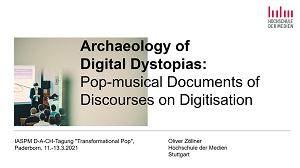Archaeology of Digital Dystopias
Pop-musical Documents of Discourses on Digitisation

In einem (englischsprachigen) Vortrag auf der Jahrestagung der "International Association for the Study of Popular Music" (IASPM) an der Universität Paderborn hat HdM-Professor Oliver Zöllner nachgezeichnet, wie die Popmusik vom Ende der 1960er-Jahre bis etwa 2000 das große Thema der digitalen Transformation aufgegriffen und verarbeitet hat. Augenfällig ist vor allem, wie vage und oberflächlich sich Pop-Produktionen meist mit der Digitalisierung befassen, obwohl gerade Musikproduktion und Musikbusiness stark von dieser Umwälzung bestimmt wurden und werden.
In continuity with earlier musical works on the impacts of information technology (e.g., by Jefferson Airplane and Pink Floyd), five highly successful longplay albums stand out as key documents of popular discourses on technology that were nascent when these longplayers were released: the Alan Parsons Project's I Robot (1976), Kraftwerk's two seminal albums The Man-Machine (1978) and Computer World (1981) that were formative for emergent synth-pop genres, and Radiohead's concept album OK Computer (1997) and its follow-up Kid A (2000).
The presentation looked at these albums' negotiations of the future of mankind in the era of digital technology by analysing the musical, textual and pictorial messages that the LP (and subsequently CD) bundle format collects and which are treated as "documents" imbued with a particular "habitus" (following the interpretive approach of Ralf Bohnsack's [2011] documentary method). Major topics that are identifiable on the albums focus on surveillance, power and society, and are presented in largely dystopian and paranoid terms by both the Alan Parsons Project and Radiohead, and somewhat ambiguously by Kraftwerk who are swaying between melancholy and fear of digital technology. Much of what we hear on these albums − or rather, what we don't hear on them − is in denial of digitisation, or at least avoiding any deeper negotiations of its impact on the individual or society at large. This is astounding if you consider their impact on popular collective imaginations. Radiohead's seminal and highly regarded OK Computer album, for instance, contains almost no references to digitisation or computerisation, but is full of moods that deal with despair, control, and surveillance. Kraftwerk's output, however, deviates from these shortcomings. On Computer World (1981) in particular they negotiate many of digitisation's topics that are still relevant today, such as data capitalism, creativity, online dating, and dominion − and they do so in astounding detail. In addition, with all their bleeps, chirps, whooshes and syncopated rhythms, Kraftwerk provided us with a soundtrack of digitisation that somehow stuck in our ears.
Music oscillating between utopian and dystopian visions
Many of the aforementioned attitudes, the presentation argued, have set the tone for future understandings of digitisation. What the records/documents under scrutiny are effectively offering is a foreshadowing of major topics of what we today call digital ethics, and it is in this light that we need to understand and decipher these albums today. Kraftwerk, it can be argued, have addressed digitisation, robotics, and artifical intelligence in the most versatile way, despite the fact that their lyrics (on The Man-Machine and Computer World) remain largely undecided and oscillating between utopian and dystopian visions. However, much of this lyrical production still reads like a well-structured programme for digital ethics in many ways (see Zöllner 2018).
Other artists/bands that were featured in the presentation include electronic pioneer Klaus Schulze and his Cyborg visions (1973), post-punk band Joy Division ("Digital", 1978), The Police (providing us with a catchphrase that stuck: "Too Much Information" on Ghost in the Machine, 1981), Queen (if only for their sleeve artwork on News of the World, 1977), synth-poppers Orchestral Manœuvres in the Dark (with their retro Dazzle Ships, 1983), drum and bass act Roni Size & Reprazent ("Digital" on New Forms, 1997), and laconic German rockers Tocotronic and their album Digital ist besser (1995) that uses 'digital' as a buzzword only but never reflects on the concept behind it. In pop music, one could say, digitisation is largely about sloganeering and name-checking, but that might be an overall message even beyond pop music.
Vortrag auf Veranstaltung: Transformational POP (4th IASPM D-A-CH Conference)
Veranstaltungsort: Universität Paderborn
Datum: 11.03.2021 bis 13.03.2021
Weiterführende Links:
International Association for the Study of Popular Music (IAMCR), German-speaking Branch
Zöllner, Oliver (2018): Wer sind die Roboter? Eine popkulturell abgeleitete Sicht auf das Mensch-Maschine-Verhältnis. In: Petra Grimm/Oliver Zöllner (Hrsg.): Mensch – Maschine. Ethische Sichtweisen auf ein Spannungsverhältnis. Stuttgart: Steiner, S. 7-17.
Autoren
- Name:
-
Prof.
Dr. Oliver Zöllner

- Forschungsgebiet:
- Digitale Ethik, Empirische Medienforschung, Soziologie der Medienkommunikation, Public Diplomacy
- Funktion:
- Professor
- Lehrgebiet:
- Medienforschung, Soziologie der Medienkommunikation, Digitale Ethik, Public Diplomacy, Nation Branding, Hörfunkjournalismus
- Studiengang:
- Medienwirtschaft (Bachelor, 7 Semester)
- Fakultät:
- Fakultät Electronic Media
- Raum:
- 216, Nobelstraße 10 (Hörsaalbau)
- Telefon:
- 0711 8923-2281
- Telefax:
- 0711 8923-2206
- E-Mail:
- zoellner@hdm-stuttgart.de
- Homepage:
- https://www.oliverzoellner.de
Eingetragen von
Mehr zu diesem Autor

